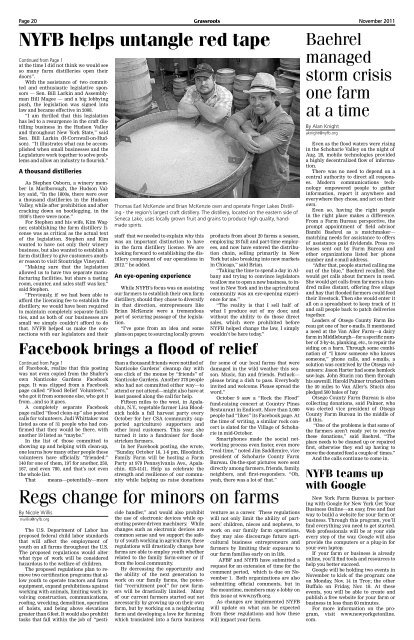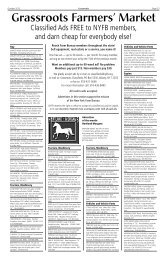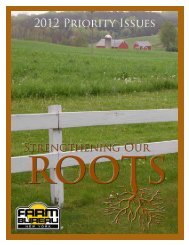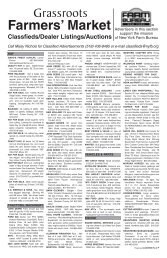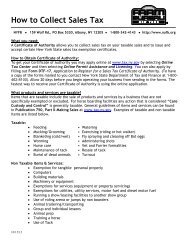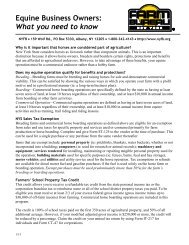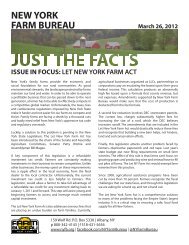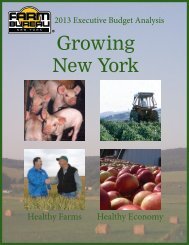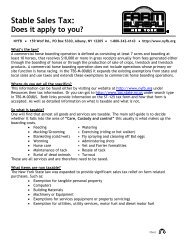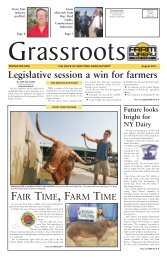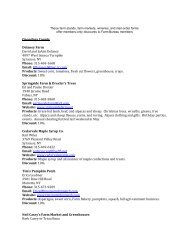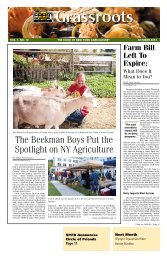Facebook brings a flood of relief to frazzled farmers - New York Farm ...
Facebook brings a flood of relief to frazzled farmers - New York Farm ...
Facebook brings a flood of relief to frazzled farmers - New York Farm ...
You also want an ePaper? Increase the reach of your titles
YUMPU automatically turns print PDFs into web optimized ePapers that Google loves.
Page 20 Grassroots November 2011<br />
NYFB helps untangle red tape<br />
Continued from Page 1<br />
at the time I did not think we would see<br />
so many farm distilleries open their<br />
doors”.<br />
With the assistance <strong>of</strong> two committed<br />
and enthusiastic legislative sponsors<br />
— Sen. Bill Larkin and Assemblyman<br />
Bill Magee — and a big lobbying<br />
push, the legislation was signed in<strong>to</strong><br />
law and became effective in 2008.<br />
“I am thrilled that this legislation<br />
has led <strong>to</strong> a resurgence in the craft distilling<br />
business in the Hudson Valley<br />
and throughout <strong>New</strong> <strong>York</strong> State,” said<br />
Sen. Bill Larkin (R-Cornwall-on-Hudson).<br />
“It illustrates what can be accomplished<br />
when small businesses and the<br />
Legislature work <strong>to</strong>gether <strong>to</strong> solve problems<br />
and allow an industry <strong>to</strong> flourish.”<br />
A thousand distilleries<br />
As Stephen Osborn, a winery member<br />
in Marlborough, the Hudson Valley<br />
said, “In the 1800s, there were over<br />
a thousand distilleries in the Hudson<br />
Valley, while after prohibition and after<br />
cracking down on bootlegging, in the<br />
1930’s there were none.”<br />
For Stephen and his wife, Kim Wagner,<br />
establishing the farm distillery license<br />
was as critical as the actual text<br />
<strong>of</strong> the legislation. Stephen and Kim<br />
wanted <strong>to</strong> have not only their winery<br />
business, but also wanted <strong>to</strong> establish a<br />
farm distillery <strong>to</strong> give cus<strong>to</strong>mers another<br />
reason <strong>to</strong> visit S<strong>to</strong>utridge Vineyard.<br />
“Making sure that the legislation<br />
allowed us <strong>to</strong> have two separate manufacturing<br />
facilities, but share a tasting<br />
room, counter, and sales staff was key,”<br />
said Stephen.<br />
“Previously, if we had been able <strong>to</strong><br />
afford the licensing fee <strong>to</strong> establish the<br />
distillery, we would have been required<br />
<strong>to</strong> maintain completely separate facilities,<br />
and as both <strong>of</strong> our businesses are<br />
small we simply couldn’t afford <strong>to</strong> do<br />
that. NYFB helped us make the connections<br />
with our legisla<strong>to</strong>rs and their<br />
Continued from Page 1<br />
<strong>of</strong> <strong>Facebook</strong>, realize that this posting<br />
was not even copied from the Shafer’s<br />
own Nanticoke Gardens <strong>Facebook</strong><br />
page. It was clipped from a <strong>Facebook</strong><br />
page called “Flood Relief Volunteers,”<br />
who got it from someone else, who got it<br />
from…and so it goes.<br />
A completely separate <strong>Facebook</strong><br />
page called “<strong>flood</strong> clean-up” also posted<br />
calls for volunteers. Judi Whittaker was<br />
listed as one <strong>of</strong> 31 people who had confirmed<br />
that they would be there, with<br />
another 19 listed as “maybe.”<br />
In the list <strong>of</strong> those committed <strong>to</strong><br />
showing up and helping with clean-up,<br />
one learns how many other people these<br />
volunteers have <strong>of</strong>ficially “friended:”<br />
140 for one <strong>of</strong> them, 197 for another, 258,<br />
167, and even 780, and that’s not even<br />
the whole list.<br />
That means—potentially—more<br />
Thomas Earl McKenzie and Brian McKenzie own and operate Finger Lakes Distilling<br />
- the region’s largest craft distillery. The distillery, located on the eastern side <strong>of</strong><br />
Seneca Lake, uses locally grown fruit and grains <strong>to</strong> produce high quality, handmade<br />
spirits.<br />
staff that we needed <strong>to</strong> explain why this<br />
was an important distinction <strong>to</strong> have<br />
in the farm distillery license. We are<br />
looking forward <strong>to</strong> establishing the distillery<br />
component <strong>of</strong> our operations in<br />
2012.” he added.<br />
An eye-opening experience<br />
While NYFB’s focus was on assisting<br />
our <strong>farmers</strong> <strong>to</strong> establish their own farm<br />
distillery, should they chose <strong>to</strong> diversify<br />
in that direction, entrepreneurs like<br />
Brian McKenzie were a tremendous<br />
part <strong>of</strong> securing passage <strong>of</strong> the legislation.<br />
“I’ve gone from an idea and some<br />
plans on paper, <strong>to</strong> sourcing locally grown<br />
products from about 20 farms a season,<br />
employing 18 full and part-time employees,<br />
and now have entered the distribution<br />
chain, selling primarily in <strong>New</strong><br />
<strong>York</strong> but also breaking in<strong>to</strong> new markets<br />
in Chicago,” said Brian.<br />
“Taking the time <strong>to</strong> spend a day in Albany<br />
and trying <strong>to</strong> convince legisla<strong>to</strong>rs<br />
<strong>to</strong> allow me <strong>to</strong> open a new business, <strong>to</strong> invest<br />
in <strong>New</strong> <strong>York</strong> and in the agricultural<br />
community was an eye-opening experience<br />
for me.”<br />
“The reality is that I sell half <strong>of</strong><br />
what I produce out <strong>of</strong> my door, and<br />
without the ability <strong>to</strong> do those direct<br />
sales, which were prohibited before<br />
NYFB helped change the law, I simply<br />
wouldn’t be here <strong>to</strong>day.”<br />
<strong>Facebook</strong> <strong>brings</strong> a <strong>flood</strong> <strong>of</strong> <strong>relief</strong><br />
than a thousand friends were notified <strong>of</strong><br />
Nanticoke Gardens’ cleanup day with<br />
one click <strong>of</strong> the mouse by “friends” <strong>of</strong><br />
Nanticoke Gardens. Another 378 people<br />
who had not committed either way—<strong>to</strong><br />
attend or not attend—might also have at<br />
least passed along the call for help.<br />
Fifteen miles <strong>to</strong> the west, in Apalachin,<br />
N.Y., vegetable farmer Lisa Bloodnick<br />
holds a fall harvest party every<br />
Oc<strong>to</strong>ber for her CSA (community supported<br />
agriculture) supporters and<br />
other loyal cus<strong>to</strong>mers. This year, she<br />
turned it in<strong>to</strong> a fundraiser for <strong>flood</strong>stricken<br />
<strong>farmers</strong>.<br />
In her <strong>Facebook</strong> posting, she wrote,<br />
“Sunday, Oc<strong>to</strong>ber 16, 1-6 pm, Bloodnick<br />
Family <strong>Farm</strong> will be hosting a <strong>Farm</strong><br />
Party at 979 Pennsylvania Ave., Apalachin.<br />
625-4141. Help us celebrate the<br />
strength and resilience <strong>of</strong> our community<br />
while helping us raise donations<br />
for some <strong>of</strong> our local farms that were<br />
damaged in the wild weather this season.<br />
Music, fun and friends. Potluck—<br />
please bring a dish <strong>to</strong> pass. Everybody<br />
invited and welcome. Please spread the<br />
word.”<br />
Oc<strong>to</strong>ber 9 saw a “Rock the Flood”<br />
fund-raising concert at Country Pines<br />
Restaurant in Endicott. More than 3,000<br />
people had “likes” its <strong>Facebook</strong> page. At<br />
the time <strong>of</strong> writing, a similar rock concert<br />
is slated for the Village <strong>of</strong> Schoharie<br />
in mid-Oc<strong>to</strong>ber.<br />
Smartphones made the social networking<br />
process even faster, even more<br />
“real-time,” noted Jim Saddlemire, vice<br />
president <strong>of</strong> Schoharie County <strong>Farm</strong><br />
Bureau. On-the-spot pictures were sent<br />
directly among <strong>farmers</strong>, friends, family,<br />
neighbors, and first-responders. “Oh,<br />
yeah, there was a lot <strong>of</strong> that.”<br />
Regs change for minors on farms<br />
By Nicole Willis<br />
nwillis@nyfb.org<br />
The U.S. Department <strong>of</strong> Labor has<br />
proposed federal child labor standards<br />
that will affect the employment <strong>of</strong><br />
youth on all farms throughout the U.S.<br />
The proposed regulations would alter<br />
what type <strong>of</strong> work will be considered<br />
hazardous <strong>to</strong> the welfare <strong>of</strong> children.<br />
The proposed regulations plan <strong>to</strong> remove<br />
two certification programs that allow<br />
youth <strong>to</strong> operate trac<strong>to</strong>rs and farm<br />
equipment, expand prohibitions against<br />
working with animals, limiting work involving<br />
construction, communications,<br />
ro<strong>of</strong>ing, wrecking, demolition, operation<br />
<strong>of</strong> hoists, and being above elevations<br />
greater than 6 feet. It would also prohibit<br />
tasks that fall within the job <strong>of</strong> “pesticide<br />
handler,” and would also prohibit<br />
the use <strong>of</strong> electronic devices while operating<br />
power-driven machinery. While<br />
changes such as electronic devices are<br />
common sense and we support the safety<br />
<strong>of</strong> youth working in agriculture, these<br />
regulations will drastically change how<br />
farms are able <strong>to</strong> employ youth whether<br />
related <strong>to</strong> the family farm-owner or if<br />
from the local community.<br />
By decreasing the opportunity and<br />
the ability <strong>of</strong> the next generation <strong>to</strong><br />
work on our family farms, the potential<br />
“recruitment pool” for new <strong>farmers</strong><br />
will be drastically limited. Many<br />
<strong>of</strong> our current <strong>farmers</strong> started out not<br />
necessarily by growing up on their own<br />
farm, but by working on a neighboring<br />
farm and developing a love for farming<br />
which translated in<strong>to</strong> a farm business<br />
venture as a career. These regulations<br />
will not only limit the ability <strong>of</strong> partners’<br />
children, nieces and nephews, <strong>to</strong><br />
work on our family farm operations,<br />
they may also discourage future agricultural<br />
business entrepreneurs and<br />
<strong>farmers</strong> by limiting their exposure <strong>to</strong><br />
our farm families early on in life.<br />
AFBF and NYFB have submitted a<br />
request for an extension <strong>of</strong> time for the<br />
comment period, which is due on November<br />
1. Both organizations are also<br />
submitting <strong>of</strong>ficial comments, but in<br />
the meantime, members may e-lobby on<br />
this issue at www.nyfb.org.<br />
As changes are implemented NYFB<br />
will update on what can be expected<br />
from these regulations and how these<br />
will impact your farm.<br />
Baehrel<br />
managed<br />
s<strong>to</strong>rm crisis<br />
one farm<br />
at a time<br />
By Alan Knight<br />
aknight@nyfb.org<br />
Even as the <strong>flood</strong> waters were rising<br />
in the Schoharie Valley on the night <strong>of</strong><br />
Aug. 28, mobile technologies provided<br />
a highly decentralized flow <strong>of</strong> information.<br />
There was no need <strong>to</strong> depend on a<br />
central authority <strong>to</strong> direct all responses.<br />
Modern communications technology<br />
empowered people <strong>to</strong> gather<br />
information, report it anywhere and<br />
everywhere they chose, and act on their<br />
own.<br />
Even so, having the right people<br />
in the right place makes a difference.<br />
From a <strong>Farm</strong> Bureau perspective, the<br />
prompt appointment <strong>of</strong> field advisor<br />
Bambi Baehrel as a matchmaker—<br />
matching needs for assistance <strong>to</strong> <strong>of</strong>fers<br />
<strong>of</strong> assistance paid dividends. Press releases<br />
sent out by <strong>Farm</strong> Bureau and<br />
other organizations listed her phone<br />
number and e-mail address.<br />
“After that, people started calling me<br />
out <strong>of</strong> the blue,” Baehrel recalled. She<br />
would get calls about <strong>farmers</strong> in need.<br />
She would get calls from <strong>farmers</strong> a hundred<br />
miles distant, <strong>of</strong>fering free silage<br />
and hay that <strong>flood</strong>ed <strong>farmers</strong> could feed<br />
their lives<strong>to</strong>ck. Then she would enter it<br />
all on a spreadsheet <strong>to</strong> keep track <strong>of</strong> it<br />
and call people back <strong>to</strong> patch deliveries<br />
<strong>to</strong>gether.<br />
Leaders <strong>of</strong> Otsego County <strong>Farm</strong> Bureau<br />
got one <strong>of</strong> her e-mails. It mentioned<br />
a need at the Van Aller <strong>Farm</strong>—a dairy<br />
farm in Middleburgh—for a specific number<br />
<strong>of</strong> 2-by-4s, planking, etc., <strong>to</strong> repair the<br />
siding on a barn. Through some combination<br />
<strong>of</strong> “I know someone who knows<br />
someone,” phone calls, and e-mails, a<br />
solution was contrived by the Otsego volunteers:<br />
Jason Harter had some hemlock<br />
saw-logs. John Stucin ran them through<br />
his sawmill. Harold Palmer trucked them<br />
the 50 miles <strong>to</strong> Van Aller’s. Stucin also<br />
pledged 500 bales <strong>of</strong> hay.<br />
Otsego County <strong>Farm</strong> Bureau is also<br />
collecting donations, said Palmer, who<br />
was elected vice president <strong>of</strong> Otsego<br />
County <strong>Farm</strong> Bureau in the middle <strong>of</strong><br />
all this.<br />
“One <strong>of</strong> the problems is that some <strong>of</strong><br />
the <strong>farmers</strong> aren’t ready yet <strong>to</strong> receive<br />
these donations,” said Baehrel. “The<br />
place needs <strong>to</strong> be cleaned up or repaired<br />
first, otherwise they end up having <strong>to</strong><br />
move the donated feed a couple <strong>of</strong> times.”<br />
And the calls continue <strong>to</strong> come in.<br />
NYFB teams up<br />
with Google<br />
<strong>New</strong> <strong>York</strong> <strong>Farm</strong> Bureau is partnering<br />
with Google for <strong>New</strong> <strong>York</strong> Get Your<br />
Business Online—an easy, free and fast<br />
way <strong>to</strong> build a website for your farm or<br />
business. Through this program, you’ll<br />
find everything you need <strong>to</strong> get started.<br />
Web pr<strong>of</strong>essionals will be at your side<br />
every step <strong>of</strong> the way. Google will also<br />
provide the computers or a plug-in for<br />
your own lap<strong>to</strong>p.<br />
If your farm or business is already<br />
online, you’ll find <strong>to</strong>ols and resources <strong>to</strong><br />
help you better succeed.<br />
Google will be holding two events in<br />
November <strong>to</strong> kick <strong>of</strong> the program: one<br />
on Monday, Nov. 14 in Troy; the other<br />
Buffalo on Friday, Nov. 18. At these<br />
events, you will be able <strong>to</strong> create and<br />
publish a free website for your farm or<br />
business in less than 60 minutes.<br />
For more information on the program,<br />
visit www.newyorkge<strong>to</strong>nline.<br />
com.


